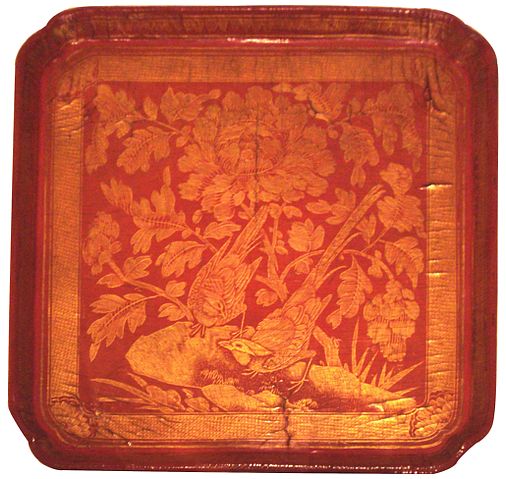
File:Red lacquer tray with gold engraving, Song Dynasty.jpg

| |
This is a file from the Wikimedia Commons. Information from its description page there is shown below.
Commons is a freely licensed media file repository. You can help. |
Summary
| DescriptionRed lacquer tray with gold engraving, Song Dynasty.jpg |
A Chinese red lacquer tray over wood with engraved golden foil, from the Song Dynasty (960–1279 AD), dated 12th to early 13th century. As the Freer and Sackler Galleries museum description states, in China the gold-engraving technique is called qiangjin. The museum caption states that this method has existed since roughly the 3rd century AD, although it was not until the Song Dynasty era that gold engravings were found on luxury lacquerwares. After a wooden tray was covered with multiple layers of cinnabar-colored lacquer, fine lines were then incised into the new surface. These incisions were then filled with an adhesive of clear lacquer, followed by the pressing of gold foil into the grooves. The two long-tailed birds and a peony plant depicted in this tray are symbolic of longevity and prosperity in Chinese culture, since the Chinese word for "long life" (shou) sounds similar to the words for long-tailed birds (dai shou). In his book Han Civilization (1982, New Haven: Yale University Press), Wang Zhongshu would firmly disagree with the Freer and Sackler Gallery Museum description about the date of the oldest lacquerware luxury goods using the incising and gold foil technique, which he says was called pingtuo. From an ancient Han Dynasty (202 BC – 220 AD) tomb at Guanghua in Hubei province, archaeologists discovered lacquerwares having "incised tiger, hare, bird, and other animal and cloud-scroll designs were filled in with gold so that they resemble the gold- and silver-inlaid decorations on bronzes...Individual motifs were cut out from thin sheets of gold or silver and attached to the lacquered surface of the vessel, resembling what was later known as pingtuo" (Page 82). |
| Date | 29 June 2008 |
| Source | Self-made at the Freer and Sackler Galleries, Washington D.C. |
| Author | User:PericlesofAthens |
This image was improved or created by the Wikigraphists of the Graphic Lab (fr). You can propose images to clean up, improve, create or translate as well.
বাংলা | català | česky | Deutsch | Deutsch (Sie-Form) | Ελληνικά | English | Esperanto | español | suomi | français | עברית | magyar | Հայերեն | italiano | 한국어 | македонски | Bahasa Melayu | Plattdüütsch | Nederlands | occitan | polski | português | română | русский | slovenščina | svenska | татарча/tatarça | Türkçe | українська | 中文 | 中文(简体) | 中文(繁體) | Zazaki | +/−
Licensing
|
File usage
Background information
All five editions of Schools Wikipedia were compiled by SOS Children. More than 2 million people benefit from the global charity work of SOS Children's Villages, and our work in 133 countries around the world is vital to ensuring a better future for vulnerable children. Will you help another child today?

